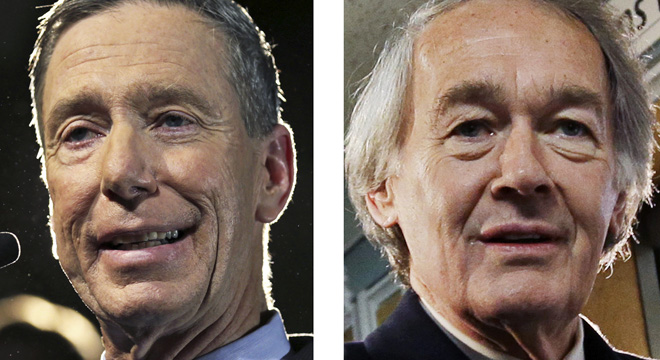While the Boston Marathon bombing has dominated headlines and airwaves for the past two weeks, there’s another story playing out in Massachusetts that has gotten far less attention: the special Senate election to fill the seat vacated when John Kerry was named secretary of state. On Tuesday, voters will head to the polls for the primary in that race and pick the final candidates in each party in a race defined by a breakneck pace forced by Kerry’s departure, bickering, and the backdrop of the bombing.
The unique circumstances have added an element of uncertainty to the election, but two things remain clear: whoever wins the Democratic primary seems assured of a win in June’s general election, and Rep. Ed Markey (D-MA) looks on track to win the Democratic primary.
“With a special election, regardless of what occurred in Boston, there’s always a great unknown when it comes to turnout. It’s a different dynamic than in a race with a regular, scheduled timeline. So, when you throw in the aspect of the terrible activities in Boston last week, I think we’re all going to find out what the turnout is on Tuesday,” explained Alicia Preston, a spokeswoman for Republican candidate Michael Sullivan.
Markey, the dean of Massachusetts’ congressional delegation, was the first entrant into the race, in late December just days after President Barack Obama announced Kerry’s Cabinet nomination. He has stayed ahead of his opponent in the Democratic primary, Rep. Stephen Lynch (D-MA), ever since, leading in every poll and racking up the support of the Bay State’s Democratic establishment, including Kerry.
Markey’s support from other Massachusetts Democratic politicians stems from the fact Lynch has a reputation for being somewhat conservative compared to other Democrats in the deep blue Bay State. Despite being known for sometimes siding with House Republicans (most notably on healthcare reform), Lynch has defended his progressive bona fides by claiming he could only be considered remotely conservative in a state as liberal as Massachusetts.
“Calling me the least liberal member from Massachusetts is like calling me the slowest Kenyan in the Boston Marathon,” Lynch quipped to the Boston Globe in 2010. “It’s all relative.”
That argument hasn’t stopped the Markey campaign from attempting to cast him as being out of step with the values of most Massachusetts voters. As Markey spokesman Andrew Zucker put it to TPM, his candidate is, the “only Democratic, pro-choice candidate in the race who can be trusted to protect a woman’s right to choose and defend the historic healthcare reform law.”
Lynch’s team counters these attacks on his abortion views by pointing to the fact that, though he was classified as “anti-choice” by NARAL, the pro-choice group gave a thumb’s up to all of his votes in its most recent congressional ratings. Scott Ferson, a spokesperson for Lynch, also pointed out Markey used to personally identify as “pro-life.”
“His position is what Ed Markey used to say, which was, ‘I’m personally pro-life,’ which is what Ted Kennedy used to say too,” Ferson said of Lynch. “However, he votes fairly consistently in support of a woman’s right to choose.”
Lynch’s campaign also hopes they can use Markey’s standing with the Democratic establishment on the Wall Street bailout and the recent sequestration can be used against him.
“Ed Markey didn’t vote for bailing out the federal government and the taxpayer on sequester,” said Ferson. “He voted against that, but he voted to bail out Wall Street.”
In the wake of the April 15 bombing, Lynch has also taken to attacking his rival on public safety and national security issues.
“Homeland security and national security issues, those really weren’t issues anyone cared about before last Monday and those are things where Lynch is more in tune with where the public is,” Ferson explained.
Markey’s team counters this by pointing to his work on national security legislation in Washington, including his push that forced airlines to screen all cargo on board passenger planes. Ferson said the Lynch campaign doesn’t “dispute” the work Markey has done on national security, but they don’t think it matches the practical concerns voters have in the wake of the Marathon bombings.
“At a time when people are firing guns in residential streets in Watertown, Ed Markey’s talking about nuclear weapons on cargo ships,” said Ferson.
On Wednesday, the results of an internal poll conducted by the Lynch campaign leaked and reportedly showed Lynch behind by six points rather than the double digit deficits he’s faced in public polls.
“Leaking your internal polling is a surefire sign of desperation from the Lynch campaign,” Andrew Zucker, a spokesman for the Markey campaign, said of the poll.
Ferson countered that argument by claiming the poll showed Markey was losing ground.
“I think not disputing our number and countering it with $600,000 worth of a TV buy might be desperate,” said Ferson. “The momentum’s moving our way. We’re seeing it.”
For their part, multiple Republicans told us they’re certain Markey is the one they will be facing in the general. Will Ritter, a spokesman for GOP candidate Gabriel Gomez, told TPM his team is “planning” for a Markey victory.
“I haven’t seen Lynch really — the Democratic machine unfortunately decided to forgo the primary and just award it to Markey, with Kerry endorsing him and the senatorial committee jumping behind Markey early,” Ritter said. “They’ve pretty much just buried Lynch before he had a chance to get his ideas out there.”
Massachusetts is a decidedly blue state, so the Democratic primary is unquestionably the main event. Both Democratic candidates have shown double digit leads over any hypothetical Republican opponent in every major poll of the possible general election matchup.
In addition to Gomez, a private equity executive and former Navy SEAL, the Republican field includes state Rep. Daniel Winslow and Mike Sullivan, a former U.S. attorney, district attorney, ATF director, and state representative.
Two major polls have been conducted in the race, one showing Gomez up by six and Sullivan in second earlier this month and a March poll that showed Sullivan leading Winslow by 20 points. Multiple staffers working for the Democratic candidates described the Republican primary as utterly unpredictable, with one saying people working on their campaign were betting on the race.
“I’ve watched a lot of Republican primaries,” one of the Democratic staffers said. “If I could find somebody who could predict accurately and figure one of those out, they could make a lot of money. I mean, there are so few voters that it’s just impossible to predict.”
Ritter said the Gomez campaign’s most recent internal polling showed they were at a “statistical dead heat with Sullivan” and “Winslow dropping.” Pearce said the Winslow campaign’s internal numbers indicate “pretty much a three way tie with 60 percent [of voters] not knowing the candidates and undecided.”
After the bombing last week, all three of the Republican candidates suspended their campaigns for several days. Since then, the campaigns have fought over negative political attacks launched in the wake of the tragedy despite pledges to keep the race positive after the incident.
Gomez criticized the Sullivan campaign for sending out a mailer that arrived at his home last Thursday, three days after the marathon attack. That mailer focused on a letter Gomez sent to Massachusetts Gov. Deval Patrick (D) asking to be temporarily named to Kerry’s Senate seat in the period between the nomination and the special election. That letter emphasized Gomez’s support for President Obama in 2008. Preston insisted the mailer was sent prior to the bombing and also described it as purely factual rather than negative.
“Some are calling it a negative mailer,” she said. “I believe it is a truth mailer.”
The Sullivan campaign isn’t the only one that resumed negative campaigning after the bombing. Last weekend, Gomez sent out a mailer of his own attacking both Winslow and Sullivan.
“I think the tone stayed mostly positive since the attack. There’s been some negative mailers on all sides, some errant tweets,” said Ritter. “The most important thing is that all three GOP candidates have said they’ll campaign for the other guy if he gets the nomination.”
Winslow’s campaign launched a website Thursday hitting “Sullivan’s checkered past and extreme social views.” That followed up a site that focused on Gomez’s letter to Patrick. Pearce defended the Winslow campaign’s decision to return to negative campaigning this week by arguing they never promised to stay positive.
“We are the only one of the candidates who have stuck to our word in the post-bombing state of the race,” claimed Pearce. “Afterwards, we suspended our campaign and … I said, ‘We’re going to stay positive for the rest of the week and we’ll re-evaluate next week.”










